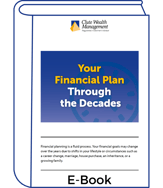
Planning for retirement is typically something we think about when we approach our 50s and 60s. However, if you haven't done much (or any) financial planning by your 30s and 40s for your future, it's time for you to get your financial house in order. Remember, when building a house, you must first start with a solid foundation. The same is true for financial planning; get the basic foundation planning done now so as you build your financial future, your structure will be strong.
Protect Your Family and Yourself
- Life Insurance: Having significant debt and/or children means you need to do “in event of death” planning in order to know what is needed to help protect your family's financial security. At a minimum, consider purchasing term insurance, which can later be converted to permanent insurance as your income increases. How much insurance you need depends on a number of things including, the amount of debt you have and your family’s need for income. As you accumulate additional assets and can provide for your family, life insurance can enhance your efforts to build a legacy.
- Health Insurance: Make sure to obtain some form of health insurance coverage for you and your family. Do some research; see what options you have available either through your employer or the exchanges. Be aware that typically the lower the premium, the higher the deductible and more out of pocket expenses. You know the health issues that face you and your family; make sure they're covered by your new health insurance provider (and verify if your existing doctors are preferred providers).
- Disability Insurance: Disability insurance is the only insurance that can help you protect one of your most valuable assets, your income, in the event you aren’t able to work due to an illness or accident. Check with your employer to see if they offer group coverage (short or long-term), but also consider purchasing an individual long-term disability policy which you can “take with you” if you leave your current position.
Budgeting Blueprint
- Save for emergencies: Have adequate reserves for at least 6 to 12 months of expenses should you have no income. The amount you put away depends on your monthly living expenses.
- Save for major purchases: Try not to take on too much debt, especially credit card debt. Buying a house or a car, for example, may be two of the largest purchases you may ever make. Try to have substantial down payments saved up before purchasing; this will help reduce your monthly interest and principal payments. Be realistic in what you can afford and don't overextend yourself or your budget. Don't become "house poor" (where your mortgage payment is so high that you can’t afford other things). Also, consider buying a reliable used car vs. a brand new one.
- Pay Down Debt: If it's financially feasible, pay down your debts as soon you can. Adopting basic budgeting habits to live within your means will result in less debt and more peace of mind in the future.
- Check Your Credit Report, Check Your Consumption: To make those large purchases noted above, you will probably need to obtain a loan from your bank, credit union or other financial institution. Checking your credit report is easy and will give you an idea of what your bank will see when reviewing your application. (You can obtain your free credit report from www.annualcreditreport.com.) Do this before you make a large purchase so you know if your report contains inaccurate data (as many do); this will give you time to try and fix any errors.
Keeping track of your budget and spending habits will help you capture more of your income for savings. Visit our website at www.clutewealthmanagement.com for user-friendly forms that can help you monitor your consumption.
Planning for Retirement
Time is on your side: people in their 30s and 40s are at an ideal age to accumulate assets for retirement. Setting aside money for the future is essential. Consider contributing to a 401(k) or other retirement plan as part of an overall strategy. Consider Roth accounts (e.g., Roth IRA or a Roth 401(k)), which allow for tax-free growth if held for a minimum of five years and you are at least 59 ½ when you start taking distributions. Be sure to take advantage of matching contributions in your employer-sponsored plan, if available, so you don’t leave "free money" on the table.
Building wealth takes time, but starting now provides you with a potential opportunity to achieve your financial goals. The plans and savings you put to work for you now can help provide you with a solid foundation that will evolve as you do.
Your Financial Plan Through the Decades E-Book
-------------
Christina Ubl, CFP® CDFA™ is co-owner of Clute Wealth Management in South Burlington, VT and Plattsburgh, NY, an independent firm and registered investment advisor that provides strategic financial and investment planning for individuals and small businesses in the Champlain Valley region of New York and Vermont. Clute Wealth Management and LPL are separate entities. The opinions voiced in this material are for general information only and not intended to provide specific advice or recommendations.
PLEASE NOTE: The information being provided is strictly as a courtesy. When you link to any of the other web sites provided here, you are leaving this web site. We make no representation as to the completeness or accuracy of information provided at these web sites.
Securities offered through LPL Financial. Member FINRA/SIPC.


